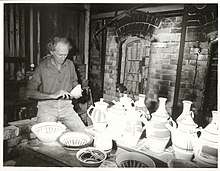Peter Stichbury (potter)
Peter Stichbury MNZM (10 March 1924 – 24 March 2015) was a studio potter from Auckland, New Zealand.

Biography
Stichbury was born in 1924.[1] In 1957, he was the first recipient of a fellowship from the Association of New Zealand Art Societies, which is now Creative New Zealand, and went with his wife Diane to St Ives, Cornwall, England to study with Bernard Leach. From there, he went to Africa and was Michael Cardew’s first western student in Abuja in Nigeria. These overseas periods were a source of inspiration for his work.[1][2][3] Stichbury set up the pottery department at Ardmore Teachers College. His pottery was given to Queen Elizabeth II during her 1974 royal tour to New Zealand.[1]
While Stichbury is mostly known for his pottery he also built musical string instruments (cellos, violas) in his later years. The work of Stichbury was honoured by exhibitions at the Auckland Museum[4] in 2004 and the New Zealand National Museum Te Papa[5] in 2011/12.
In the 2002 Queen's Birthday and Golden Jubilee Honours, Stichbury was appointed a Member of the New Zealand Order of Merit, for services to pottery.[6] Stichbury died on 24 March 2015, survived by his wife Diane and three children.[7]
References
- Elliott, Moyra (25 March 2015). "Peter Stichbury 1924–2015". Cone Ten and descending... Retrieved 26 March 2015.
- "Topic: Peter Stichbury in St Ives and Abuja: The formative years". Museum of New Zealand Te Papa Tongarewa. Retrieved 27 March 2015.
- "Topic: Peter Stichbury: Abuja, Nigeria". Museum of New Zealand Te Papa Tongarewa. Retrieved 27 March 2015.
- Peter Stichbury: a survey of a pioneer New Zealand studio potter. New Zealand: Auckland War Memorial Museum. 2007. p. 62. ISBN 9780908623129.
- "Peter Stichbury: Exhibition at the New Zealand National Museum Te Papa". Te Papa National Museum of New Zealand. Retrieved 9 August 2013.
- "Queen's Birthday and Golden Jubilee honours list 2002". Department of the Prime Minister and Cabinet. 3 June 2002. Retrieved 25 June 2020.
- "Peter M. Stichbury". The New Zealand Herald. Retrieved 27 March 2015.
External links